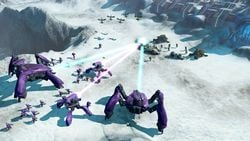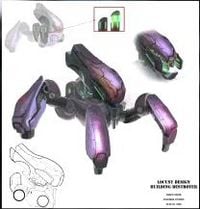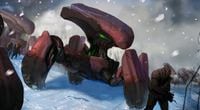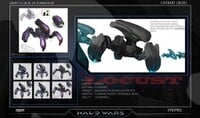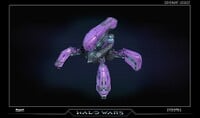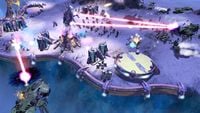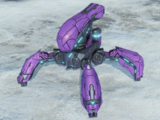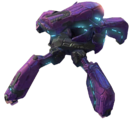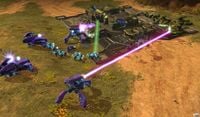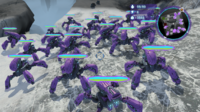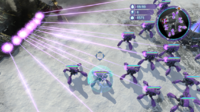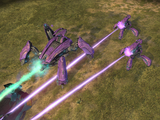Shua'ee-pattern Locust
From Halopedia, the Halo wiki
| Shua'ee-pattern Light Excavator | |
|---|---|
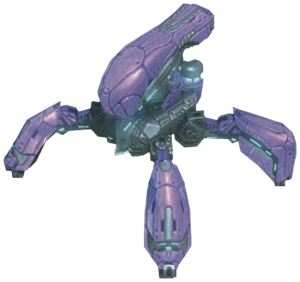
| |
| Production information | |
|
Manufacturer: |
|
|
Product line: |
|
|
Model: |
|
| Technical specifications | |
|
Length: |
|
|
Width: |
|
|
Height: |
6.8 meters (22.2 ft)[2] |
|
Mass: |
29.5 metric tons (29.0 LT; 32.5 ST)[2] |
|
Engine(s): |
Quadrupedal leg assembly |
|
Other system(s): |
|
|
Armament: |
1 light focus beam (charged plasma cannon)[4][5][6][1][2] |
|
Crew: |
|
| Usage | |
|
In service: |
|
|
Role(s): |
|
|
Affiliation: |
|
- "Destroy those Locusts wherever you find them. They're building killers!"
- — Sergeant John Forge[7]
The Shua'ee-pattern Light Excavator[2] (UNSC Type classification: Type-30 Light Excavation/Anti-Fortification Platform, T-30 LE/AFP)[1] or colloquially the Locust, is a quadrupedal Covenant vehicle used for mining and combat purposes. They are the lightest vehicles of the excavator class of mining/combat walkers in the Covenant.[8]
Among UNSC forces, Locusts have acquired a number of nicknames including the "Building Killer" and "Little Bug".[5][6]
Overview[edit]
Design details[edit]
The Locust is a relatively small quadrupedal walker, featuring four fully-articulated legs capable of traversing most terrain - [2] including climbing up and over sheer cliffs.[9] The centre of the leg assembly contains a single rotating turret based on the canopy of the Banshee ground support flyer,[5][6] which houses the vehicle's primary armament. The turret has a full 360 degree rotation capability, allowing the vehicle to aim at anything it can see. The cockpit is capable of seating one Sangheili or Jiralhanae pilot[10][1][2] - unlike both the larger excavator models (such as Scarabs) and other Locust models used by the Banished, which utilise a lekgolo colony to drive the vehicle.
The vehicle was originally designed purely as an excavation tool - intended for use in mining resources and unearthing Forerunner reliquaries. Consequently, they are lightly-armoured[5][6] and susceptible to being easily damaged in combat. During the Human-Covenant War, they were upgraded to see the inclusion of an energy shield module to better-protect the vehicle after it was pressed into combat operations against humanity.[1] The Locust can be upgraded with a Shield Amplifier, which further-upgrades the shields to have a faster recharge time.[5][6]
Armament[edit]
The Locust's primary armament is a single light focus cannon, alternatively termed a "charged plasma cannon" [2] - rated as equivalent to a heavy plasma cannon.[1] The weapon can be upgraded with an Overdrive module - allowing the vehicle to divert power from its shields to increase the power output of the cannon.[5][6]
Operational history[edit]
Human-Covenant War[edit]
In February 2531 Locusts were used by Covenant forces on Arcadia and Trove in long-range artillery roles against UNSC forces.[9][7][11]
In 2548, at least six Locusts were used by the Covenant forces on Meridian to excavate a Forerunner artifact buried underneath the town of Brume-sur-Mer.[12][13][14][15]
Post War[edit]
In the post-war era, remnants of the former Covenant empire still used the Locust, though their roles have somewhat changed: while some are employed by fierce Jiralhanae raiding parties looking to pillage colony worlds, Sangheili kaidons and warlords used them to fortify keeps and protect fragile alliances.[16] During the Carrow Conflict in September 2558, the Jiralhanae Voice of Maardoth led by Chieftain Hekabe had access to Locusts during his attack on Carrow.[17]
The Banished employ a unique variant of the Locust manufactured by the Armory of Barukaza. Free of the restrictions imposed by the San'Shyuum on the Covenant's Locusts, the Banished have seen fit to augment their Locusts with a Lekgolo crew and an uncapped power ceiling.[18]
Gameplay[edit]
Halo Wars[edit]
The Locust has the longest effective range among the Covenant ground units in Halo Wars and costs ![]() 300 resources, a tech level of
300 resources, a tech level of ![]() 2, and a population of
2, and a population of ![]() 2. The Locust is specifically designed to take down static targets and is only able to open fire when stationary. The Locust can be upgraded with the Overdrive ability as well as with the Shield Amplifier ability. The former upgrade allows the Locust to divert energy from its shield generator to its main cannon, increasing its attack power; the latter upgrade allows the unit's shield to regenerate faster.
2. The Locust is specifically designed to take down static targets and is only able to open fire when stationary. The Locust can be upgraded with the Overdrive ability as well as with the Shield Amplifier ability. The former upgrade allows the Locust to divert energy from its shield generator to its main cannon, increasing its attack power; the latter upgrade allows the unit's shield to regenerate faster.
Known as a 'building killer', the Locust is largely used to attack an enemy's defences from a safe distance. This is a useful alternative to a direct confrontation, which would result in casualties for the attacker. A small group of Locusts can be used to assist a force of smaller warriors, like Kig-yar, making it far easier for the group to destroy enemy buildings. Larger groups of Locusts can be used in surprise attacks against enemy bases and in such cases, the Locusts can often level the targeted base in thirty seconds. However, the inherent vulnerability of the unit makes this a gamble. The Locust is fairly weak against non-structure targets. Though it is able to do significant damage to units, the Locust's defences are weak and fall quickly to concentrated fire. However, its beam can lure enemy units towards awaiting forces, allowing them to be quickly cut down. Although less common, the Locust can be used quite effectively to destroy small groups of air units such as Vulture formations. This is provided the player has a sufficient number of Locusts and that they attack from long range to reduce the number of casualties that will inevitably be taken.
The following upgrades are available:
- Overdrive is a special attack that drains the Locust's shields to boost damage. Requires
 400 resources and a tech level of
400 resources and a tech level of  2.
2. - Shield Amplifier increases the Locust's shield-regeneration rate. It is useful when used with Overdrive, and its effects also stack with the 'Shield of the Forerunners' upgrade from the Temple, allowing for an even quicker regeneration rate. Requires
 800 resources and a tech level of
800 resources and a tech level of  3.
3.
Trivia[edit]
When playing as the UNSC in multiplayer or skirmish modes, Serina may say, "Watch the skies — they've got Locusts." This, along with the Locust being first encountered in-game in a mission where other attacking enemy units are airborne, and the real locust being able to fly, may mean that the Locust was intended to be an air unit at some point in the development of Halo Wars.
Gallery[edit]

|
Browse more images in this article's gallery page. |
Concept art of a Locust accompanied by Jiralhanae warriors for Halo Wars.
Locusts engaging UNSC forces.
A Locust on Harvest.
List of appearances[edit]
- Halo Wars (First appearance)
- Halo: Envoy
- Halo: Battle Born
- Halo: Meridian Divide (Mentioned only)
Sources[edit]
- ^ a b c d e f g h i Halo: The Essential Visual Guide, page 110
- ^ a b c d e f g h i j k Halo Encyclopedia (2022 edition), page 278
- ^ Halo Waypoint, Scarab (Retrieved on Jun 30, 2021) [archive]
- ^ Official Halo Wars Community Site, Game Info - Covenant Factory (Retrieved on Jan 22, 2010) [local archive] [external archive]
- ^ a b c d e f Halo Encyclopedia (2009 edition), page 245
- ^ a b c d e f Halo Encyclopedia (2011 edition), page 255
- ^ a b Halo Wars, campaign level Scarab
- ^ Halo Waypoint, Scarab (Retrieved on Apr 13, 2016) [archive]
- ^ a b Halo Wars, campaign level Dome of Light
- ^ Halo Wars, Locust in-game unit
- ^ Halo Wars, campaign level Beachhead
- ^ Halo: Battle Born, chapter 13
- ^ Halo: Battle Born, chapter 15
- ^ Halo: Battle Born, chapter 16
- ^ Halo: Battle Born, chapter 21
- ^ Halo Waypoint, Canon Fodder - No Joke (Retrieved on Jul 8, 2016) [archive]
- ^ Halo: Envoy, chapter 5
- ^ Halo Encyclopedia (2022 edition), page 467
| ||||||||||||||||||||||||||||||||
